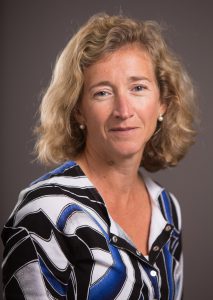Nurturing talent in the food and ag industry and helping staff to reach their full potential is a top priority for Mercedes Vázquez-Añón, Ph.D., the Senior Director of Strategic Initiatives and Account Collaboration at Novus International. Formed in 1991, Novus International is a US-based global feed additive company that provides solutions to positively impact animal performance and health through nutrition. Driven by a passion for animal production having grown up on a dairy farm in Spain, Mercedes began her career at Novus in 1996. Since then, she has progressed through numerous leadership roles where she has managed monogastric nutrition, ruminant nutrition and physiology research teams.
We sat down with Mercedes to learn more about the motivations behind her career in the food and ag industry, what it takes to manage effectively, the long-term benefits of building a diverse team and the challenges she has had to overcome to progress in her career.

[WFA] Can you start by explaining the different aspects of your role and for those who do not know, what Novus International specialises in?
[Mercedes Vázquez-Añón] I am the senior director of strategic initiatives and accounts collaboration. In this role I develop partnerships with customers, external companies, institutions, universities, and research facilities. These partnerships are aimed to benefit both parties, while furthering Novus’ goals of providing solutions to the global animal protein industry in the areas of structural health and reproduction, gut health and pathogen prevention, and nutrient utilization and sustainability.
[WFA] What inspired you to pursue a career in the agricultural industry?
[Mercedes Vázquez-Añón] I grew up on a dairy farm in Galicia, Spain, which gave me an appreciation for agriculture, animal production and all its complexities. There are so many things that can go wrong in animal production! Seeing and living through that first-hand showed me that every problem has a solution. It was interning as an undergraduate at a research facility in Spain that helped me to appreciate the need for research & development, and that is the area I decided to pursue.
I achieved a master’s degree at Penn State University and a doctorate at the University of Wisconsin-Madison. Upon graduating I joined Novus, where I was hired to develop the commercial value of our methionine product ALIMET® for dairy cows. The team was myself and one salesperson, so I wore many hats, and this helped me to earn an appreciation for different roles in sales, technical services, and marketing.
I got to work closely with several R&D leads including Chris Knight and Julia Dibner, who were phenomenal mentors to me. Starting her career in the 1980s, Julia set an example of what you can achieve as a woman in our industry. Things had changed a lot by the time I joined Novus in 1996, but Julia’s enthusiasm for research and finding solutions to relevant problems in the sector inspired me to excel at what I do. It’s all about the value you bring to the position and the company. This is still good advice for women today.
[WFA] From your many years of experience developing talent at Novus, how do you approach helping staff to reach their potential?
[Mercedes Vázquez-Añón] I think it’s important to give a person room for growth so they can discover their own value, and the earlier they do that in their career the better. My goal as a manager was not to micromanage, but to reflect on the choices my direct reports made and help them learn from them.
Working in research can be isolating at times. Making time for collaboration within your team is very important as collaboration creates an environment that expands knowledge, broadens your view of the different disciplines, and grows a team’s contribution. Without collaboration, I would not be where I am today.
When it comes to improving gender equality in food and ag, at Novus we have implemented internship programs for international graduate students to experience research in a commercial setting in the US. For my team, it was always so important that men and women were equally represented in this initiative. I have also had the honour to be part of the professional development of several hard-working and smart women from African agriculture universities. This program allowed women scientists in agricultural universities to have access to research programs and be able to grow as scientists.
[WFA] What does a diverse workforce look like to you? Can you share what you have experienced to be the benefits of building a diverse team?
[Mercedes Vázquez-Añón] Every person, regardless of where you are in the world, carries bias. Your personal history and experiences shape you and you have certain thoughts about how things are or should be. My goal in creating a team is to build a versatile group that can see and address problems in different ways.
For an international company like Novus, having a team of people from all over the world is a given. Being able to understand the needs of people from very different geographical locations provides so much power and influence and brings that understanding and perspective to how we work.
I also encourage my teams to work across different species, our swine team works together with our poultry team and our ruminant team works with our monogastric teams. Though these species of animals are different, our teams can work together to explore different perspectives and provide each other with insights they may have missed.
[WFA] What are some of the challenges Novus has had to overcome in creating greater opportunities for women to progress to a senior level?
[Mercedes Vázquez-Añón] While we do have women in leadership positions at Novus, I think we and many agriculture companies can do a better job of providing leadership opportunities earlier on in the careers of our female employees. When most people think of a “leader” they think of someone managing a team, a department or a company. What I’m referring to is encouraging young women to lead a project, take initiative or serve on the panel of an industry or research group.
When I first entered the workforce, it was pointed out to me that a common trait in women, which was enforced by traditional education, is to be humble. Though this is a very valuable personal trait, at times it can be wrongly interpreted in the workplace as being indecisive and could result in underselling oneself. As women, we have to change our own minds about our capacity to lead. Companies can help young women by providing opportunities where they can lead.
[WFA] What advice do you have for women in our industry wanting to progress their careers in the food and agriculture sector?
[Mercedes Vázquez-Añón] Women wanting to advance their careers must make it happen, because growth doesn’t always happen organically. If there is a role you would excel at, talk about it. If there’s a project where you can provide value, find a way to do it.
Agriculture is a great field to be in. It’s very resilient and open to new developments because there is always a demand. Though the industry has historically been viewed as being conservative and male dominated, that is changing as more women are in leadership positions in the industry and academically. My advice would be don’t allow what has been said about the agriculture industry to make you think there isn’t a place for women at the top, because we are witnessing an exciting change throughout the sector.
Find out more about Novus International’s work here: https://www.novusint.com/en-US/

